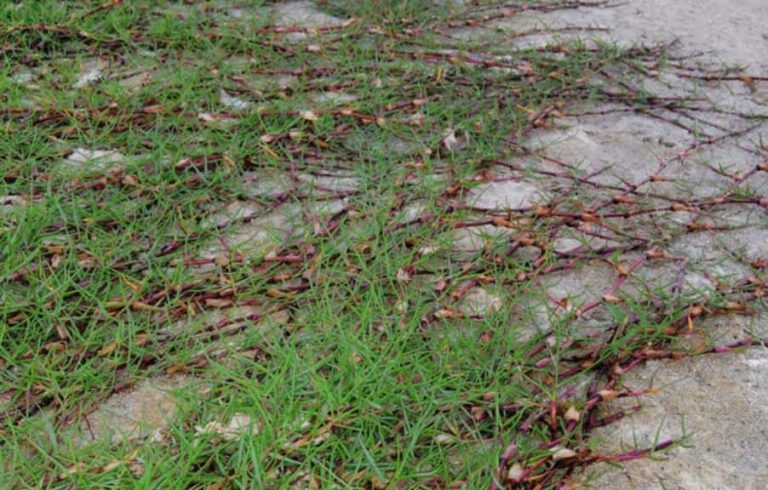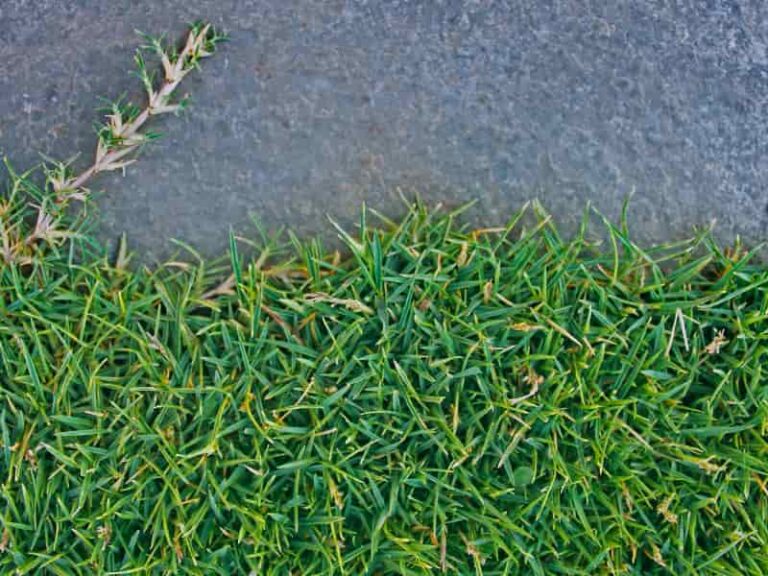Watering Bermuda Grass: Spring, Summer, Fall and Winter Guide
Although Bermuda grass is a great drought-resistant grass, providing it with too little or too much water can make it prone to disease and pests. So, how much water does Bermuda grass require?
Bermuda grass requires 1/2 inch to 3/4 inch of water every one to three weeks. During summer, the grass will need 1 to 1.25 inches of water every week to survive. If the Bermudagrass lawn is established on sandy soil, provide 0.5 inches of water as often as every 3 days.
Watering is an essential part of Bermuda lawn care, as it helps promote deeper root development for a fuller, greener turf. However, the watering needs of a Bermuda turf may differ depending on the season of the year.
Table of Contents
How much water does Bermuda grass need?
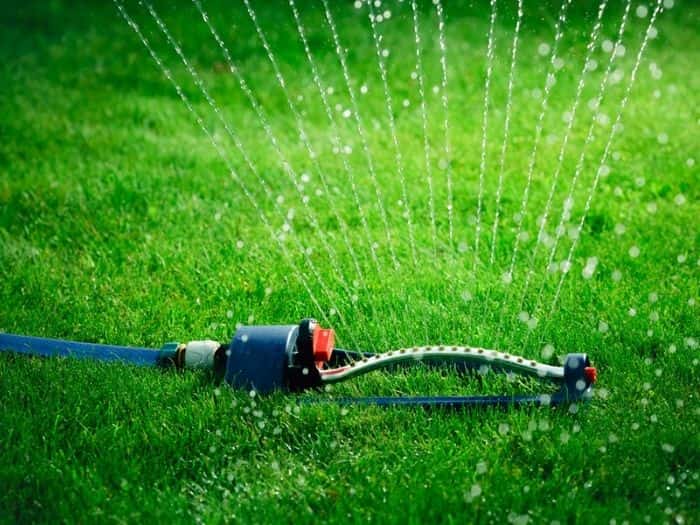
The claim that Bermuda grass is drought-tolerant is only true in the sense that it can withstand long periods of drought without dying out. However, the grass will still turn brown if it does not get adequate water.
Here’s a table showing how much water Bermuda grass requires:
| Season | Water requirements |
| Spring | 0.5-0.75 inches per week |
| Summer | 1-1.25 inches every 7 days |
| Fall | 1 inch of water once a month |
| Winter | 1 inch of water per month |
Since home lawns also serve an aesthetic purpose by contributing towards curb appeal, you need to adequately water your Bermuda turf to keep it looking lush and green and prevent it from turning brown. In the absence of consistent, weekly rainfall, you should maintain a regular irrigation schedule for your Bermuda lawn.
Bermuda turfs typically need roughly an inch of water every week.
Read More: Bermudagrass – Identification, Care, Planting, Cost & More
How often to water Bermuda grass
Water your Bermuda grass lawn deeply with 1 inch of water only as often as once every week. This frequency helps roots grow deeper, which will be an added advantage for saving water during summer.
It’s advisable to water your Bermuda grass deeply and infrequently. Since Bermuda turfgrass species typically need an inch of water every seven days, consider irrigating the lawn with an inch of water on just a single day of the week, every week. This is as opposed to applying a quarter inch of water for four consecutive days.
Infrequent but deep watering helps to condition the Bermuda grass roots to grow deeper into the soil profile. With deeper root establishment, Bermuda grass can benefit from increased moisture access.
Pro tip: Adjust your watering schedule depending on how much rainfall you’re receiving in your area. For instance, if there are puddles of water on your lawn after consecutive days of heavy downpours, avoid irrigating your lawn during that week. Once the rainfall stops and the runoff water is absorbed, you can resume your regular irrigation schedule.
Best time to water Bermuda grass
The best time to water Bermuda grass is between early morning and mid-morning to allow the water on grass blades to dry before sunset.
Avoid watering your lawn at night because temperatures are low at this time, allowing moisture to settle on grass blades for too long. Moisture increases the risk of turf diseases.
READ MORE: Best Times of Day to Mow Your Lawn
Observe your lawn closely to make sure it is not deprived of water. You’ll notice changes on your turf that will mean it is time to irrigate.
Here are the signs Bermuda grass needs watering:
- Curling or wilting leaves
- Leaf blades turning into a dark bluish-gray color
- If there’s been an extended period of dry hot weather
With these signs, you may be tempted to overwater your lawn to compensate for the drought. There are some side effects of that as I’ve elaborated below.
Can you overwater Bermuda grass?
Overwatering Bermuda grass is not a good idea because it clogs the root area, keeps the lawn overly moist for prolonged periods, and interferes with root development. An overwatered lawn is prone to fungal diseases as well as pest attacks.
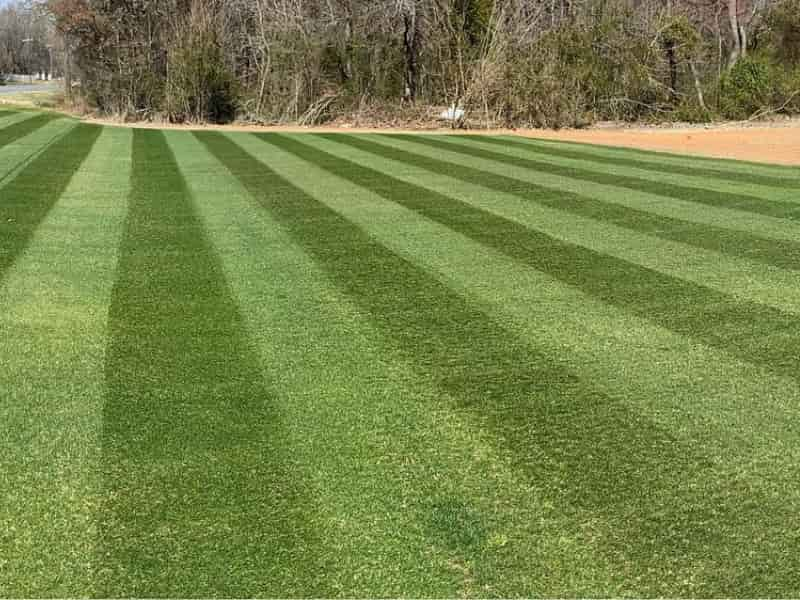
Signs of an overwatered turf include:
- Lawn fungus (brown patches)
- Shallow roots
- The ground feels spongy
- Excessive thatch buildup
For starters, overwatering will most likely create soil compaction problems, which then prevents the turf from springing back under heavy foot traffic unless you aerate and dethatch adequately. As such, you end up with foot marks on your lawn. The same applies to mowing after overwatering, as you’ll end up with unsightly lawnmower tire tracks on your lawn.
Soil compaction by way of overwatering occurs when runoff water droplets form tight bonds that seal off underground air pockets. This also cuts off the supply of oxygen to the Bermuda grass root zone. As a result the Bermuda roots die out as the soil compaction due to closed air pockets inhibits their spread, with the lack of oxygen worsening the situation.
Luckily, you can remedy lawn soil compaction of this nature by combining dethatching with core aeration.
Overwatering a Bermuda turf can also lead to lawn disease. Harmful fungi like dollar spot and brown patch fungi love to breed in consistently wet conditions and will be easily attracted to an overwatered lawn with runoff water/puddling.
These fungi leave dead spots on your Bermuda grass blades, leaving you with ugly-looking sections on the lawn.
Finally, overwatering also causes microbes to penetrate into your lawn soil, consequently hampering root growth and development. These bacteria prefer moist conditions and will cause the Bermuda roots to decay.
Remedy for Overwatering
To avoid overwatering your Bermuda turf, allow the lawn to dry up after every irrigation session. This will help lessen the chances of runoff water causing soil compaction and pathogen problems.
You should also avoid applying more than one inch of water per irrigation session, as chances are that your turfgrass won’t have dried out by nightfall if you irrigate it that much at one time.
Watering Bermuda grass in spring
During spring, Bermuda grass does not require as much irrigation as it would during summer months. However, newly sodded grass may require a little more water to faster growth and spreading into a thick turf.
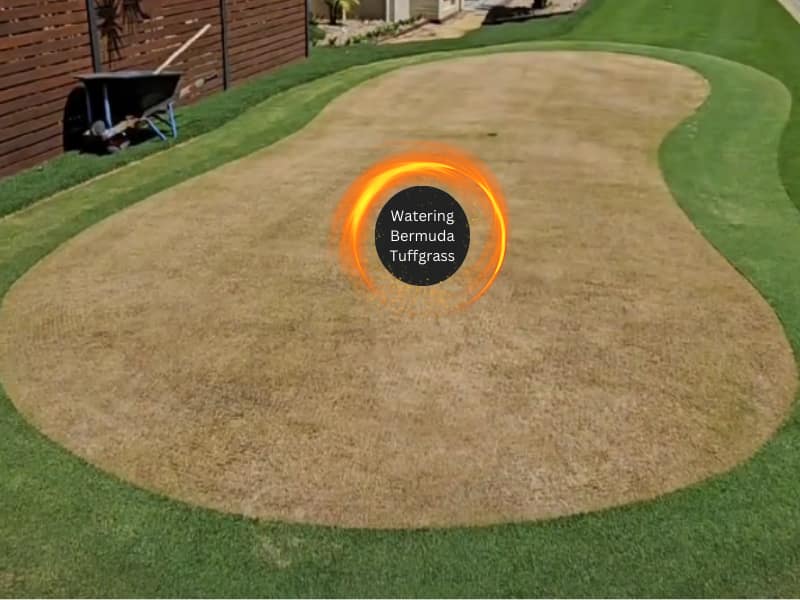
Here’s a Bermuda grass spring water maintenance guide:
- Spring water requirements: 0.5 to 0.75 inches of water
- Watering frequency: once per 7 days
During the spring months of March, April, and May, Bermuda grass requires 0.5-0.75 inches of water every seven days, as an existing Bermuda grassturf doesn’t normally require too much water at this time of the year.
You can however increase the amount of water to one inch per week if you notice that the leaf blades of your Bermuda grass plants are curling/folding and yellowing due to lack of water.
Summer Water Requirements
During the summer months of June, July, and August, irrigate your Bermuda lawn with at least 1 inch of water every seven days. This is because as the temperatures rise during these summer months, there’s increased possibility of drought stress affecting your Bermuda turf.
A regular summer irrigation schedule will help to prevent this from happening. Remember, too, that the amount of water needed and the summer irrigation frequency can be adjusted depending on the soil type and the environmental conditions in your region.
Fall Water Requirements
During the fall months of September, October, and November, you should continue irrigating your Bermuda lawn to prevent drought stress. If Bermuda dormancy sets in early in late fall, you can reduce the frequency of watering.
At this time of the year when Bermuda turf growth stops, you still need to water the lawn, albeit less often, to prevent desiccation/dehydration.
Winter Water Requirements
During winter, your Bermuda lawn will most likely be lying dormant already. However, to prevent loss of Bermuda turf due to winter drought, you still need to water your Bermuda lawn at least once every three weeks.
Should you water dormant Bermuda grass?
Bermuda grass is a warm-season turfgrass and normally goes dormant during winter, with the turf turning brown. However, this doesn’t mean that it doesn’t need to be irrigated, as Bermuda grass roots require moisture to prevent desiccation.
Nevertheless, dormant Bermuda grass still doesn’t need as much water as a Bermuda turf that’s at the active growth stage. Basically, dormant Bermuda lawns need about 0.5 inches of water every 14-21 days. Therefore, when there’s frequent winter rainfall, you can avoid irrigating the lawn.
How Long Should You Water to Get 1 Inch?
Now that you know how much water and how often to irrigate Bermuda grass, how do you measure the amount of water you’re applying to your lawn when using sprinklers? How long should you run your sprinklers to get 1 inch of water?
Here’s how:
- Position about five plastic cups on your lawn and turn on the sprinkler for about an hour. Then, measure the depth of water collected in each cup.
- Add up the total depth and divide by five to determine the average depth of water in inches applied per hour by your sprinkler system.
- Now, divide one inch by the above-average figure to gauge how long it’ll take you to irrigate your Bermuda lawn with one inch of water.
For instance, if the average depth per hour is 0.5 inches, it’ll take you two hours to irrigate your Bermuda turf to a depth of 1 inch.
How often should I water my Bermuda grass?
Bermuda grass requires about an inch of water per watering session which should be once or twice weekly depending on the weather and soil moisture. Generally, Bermuda turfgrass should be irrigated deeply but infrequently.
Always adjust the watering frequency based on weather conditions and soil moisture levels.
How long should I run my sprinklers or irrigation system to ensure adequate watering for my Bermuda grass?
Different sprinkler systems have different water output rate. Generally, 30 minutes to 1 hour should be enough to provide enough water to reach a depth of one inch for your Bermuda grass. As a general guideline to determine a good timing, you should consider the weather conditions, soil types, and sprinkler water output rate.
Should I water my Bermuda grass differently during the winter months?
Yes, you should water your Bermuda grass differently during the winter months to prevent rhizomes and stolons near the soil surface from drying out. Adjust the watering schedule to about 0.25 – 0.5 inches per session at least once every three weeks or 1 inch of water every 4 weeks.
Can I overwater Bermuda grass? What are the consequences?
Overwatering Bermuda grass on poorly drained soils, makes lawn prone to weed infestation, shallow roots, nutrients leaching, and soil gets waterlogged, which can suffocate the roots of grass leading to root rot diseases among others. Fertilization and mowing also become a problem in waterlogged lawn
What signs should I look for to determine if my Bermuda grass needs watering?
Underwatering and overwatering can lead to serious lawn problems. Striking a balance for grass is key to establishing a thriving lush Bermuda lawn. If your grass changes to yellow or tan, thinning-out, experiences slow weak growth or come-back, dry soil, and footprint on your grass are signs your grass needs water.
References
- Fred Yelverton et al, Extension Specialist (Turfgrass/Forage Crop Weed Mgt) Crop & Soil Sciences, NC State University: Bermudagrass Lawn Maintenance Calendar
- The University of Arizona, College of Agriculture and Life Sciences: Phoenix Lawn Watering Guide


